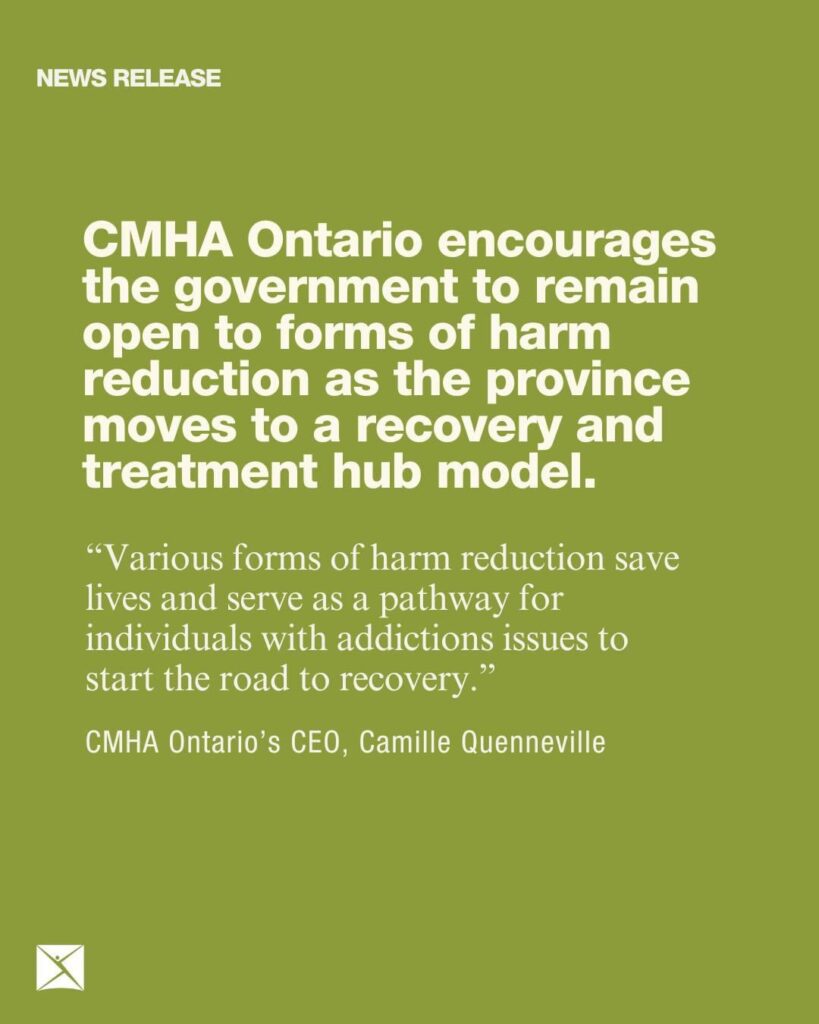Menu
Close

Maintain aspects of harm reduction as part of hub model; lessen the stigma around opioid use
Aug 21, 2024
(Ottawa, Aug. 20, 2024) – Canadian Mental Health Association (CMHA), Ontario Division is urging the province to remain focused on addressing the opioid crisis as a health issue, that includes aspects of harm reduction, without perpetuating stigma that is often detrimental to individuals seeking help.
CMHA Ontario encourages the government to remain open to forms of harm reduction as the province moves to a recovery and treatment hub model.
“Various forms of harm reduction save lives and serve as a pathway for individuals with addictions issues to start the road to recovery,” said CMHA Ontario CEO Camille Quenneville. “It is as much part of an effective continuum of care as addiction counselling, housing and other wraparound supports.”
Yesterday, the Ontario government announced the provincially-funded consumption and treatment service sites across the province will be replaced by 19 community treatment hubs. Named Homeless Addiction Recovery Treatment (HART) sites, the new program will invite community partners to submit a proposal for a care hub model in their region. Here is the link to the government release: Ontario Protecting Communities and Supporting Addiction Recovery with New Treatment Hubs | Ontario Newsroom. This announcement doesn’t change the commitment from CMHA Ontario and 27 CMHA branches throughout the province to deliver high-quality care to the individuals we serve.
“We will continue working with the government and our partners to ensure we provide the very best care to all individuals in need of support,” Quenneville said. “This includes collaborating with municipalities and other partners in this new hub model.”
The opioid crisis is a public health challenge. People from all walks of life – whether employed or unemployed, housed or unhoused, young or old, etc. – are impacted by addiction through regulated opioids or a toxic drug supply.
- There were 2,645 opioid toxicity deaths in Ontario in 2023.
- A 2021 study shows that 60 per cent of people who died from opioid toxicity were employed.
- The rates of opioid-related hospitalizations and deaths are higher among workers in the construction, mining, oil and gas sectors.
- After alcohol, opioids are the most common substance used by high school students in Ontario.
- The use of opioids by high school students has increased more than 70 per cent from 2021 to 2023.
The issue of substance use health is complex. And while the government is developing a new plan to tackle opioids, it’s also liberalizing the sales of alcohol, which is a significant driver of health care costs, without a strategy to reduce harms.
“CMHA Ontario is part of a coalition calling on the province for an alcohol strategy,” Quenneville said. “It’s clear there needs to be a comprehensive strategy for substance use, because no matter the substance someone uses, they deserve access to appropriate care, including harm reduction.”
Fast facts:
- A person in Ontario is dying of drug poisoning/overdose every 2.5 hours (almost 10 people per day).
- Between March 2020 and January 2024, Consumption and Treatment Services (CTS) sites in Ontario reversed nearly 21,000 overdoses, keeping individuals out of hospital emergency rooms.
- There have been zero reported overdose-related deaths at CTS sites in Canada, according to Health Canada.